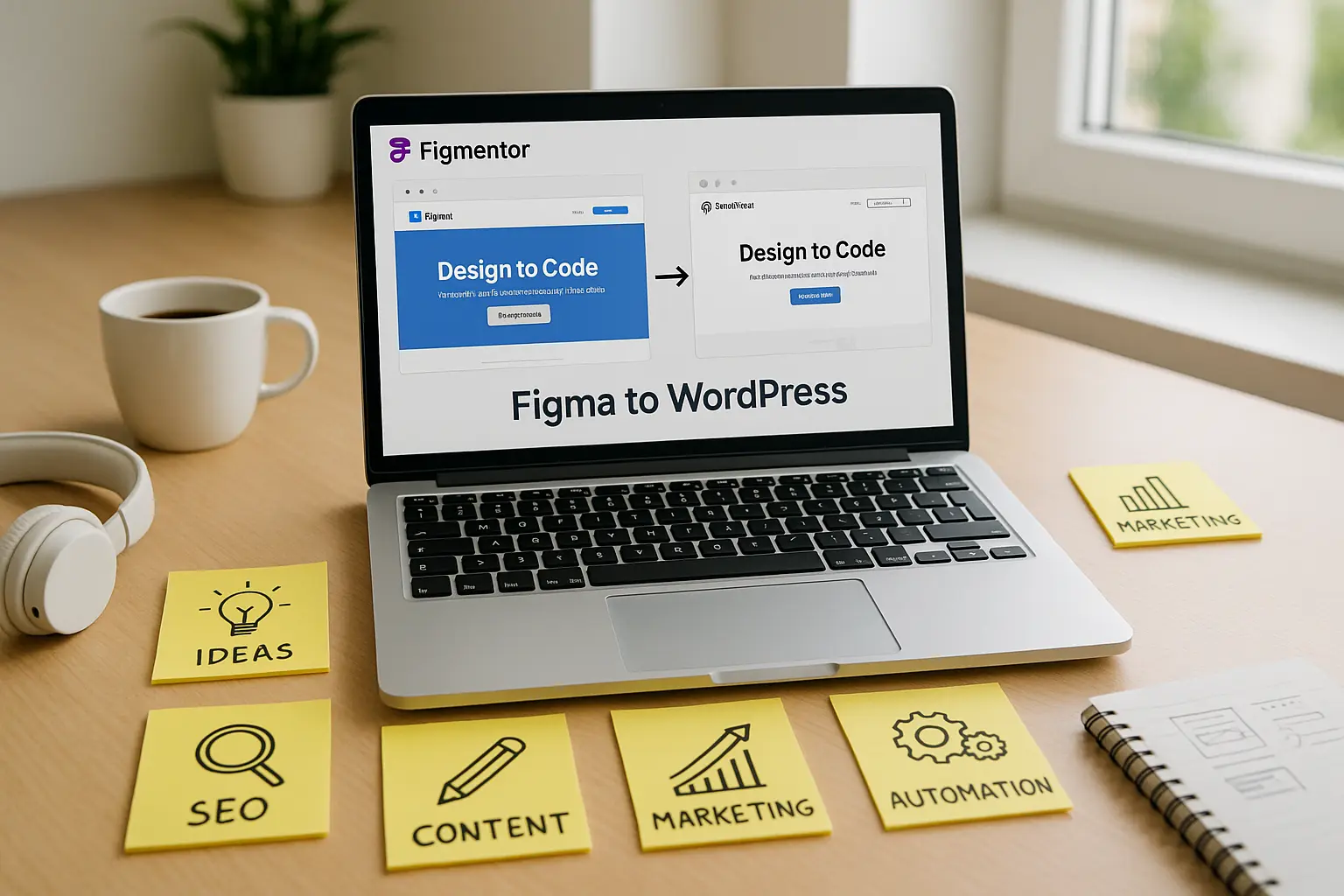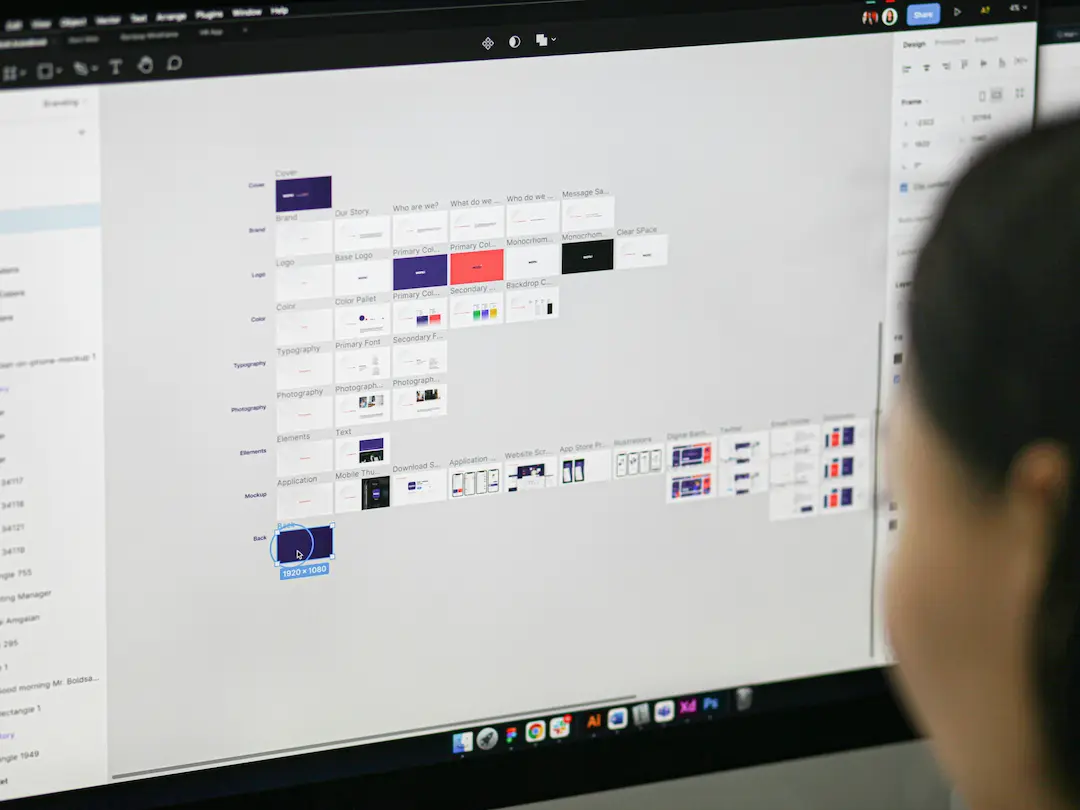Introduction
Converting Figma designs to WordPress is a common challenge for designers, developers, and agencies. Whether you’re a freelancer, a startup founder, or part of a design-to-development team, understanding the process can save time, reduce costs, and improve efficiency.
In this guide, we answer the top 10 most frequently asked questions about Figma to WordPress conversion, covering tools, best practices, automation, and troubleshooting.
By the end, you’ll have a clear roadmap for seamless Figma-to-WordPress workflows.
1. What Is the Best Way to Convert Figma to WordPress?
The best method depends on your technical expertise and project requirements. Here are the top approaches:
Manual Conversion (For Developers)
- Pros: Full control over code, better performance, customization.
- Cons: Time-consuming, requires coding knowledge.
- Best for: Custom WordPress themes, high-performance sites.
Using Plugins (For Non-Developers)
- Pros: Fast, no coding required, cost-effective.
- Cons: Limited customization, potential bloat.
- Best for: Quick deployments, simple websites.
Automated Tools (For Efficiency)
- Pros: Balances speed and customization, reduces manual work.
- Cons: May require tweaks for pixel-perfect results.
- Best for: Agencies, freelancers, and teams needing scalability.
Recommended Tools:
- Figmentor (Best for Elementor users)
- Anima (For high-fidelity conversions)
- RelayThat (For landing pages)
2. Can I Convert Figma to WordPress Without Coding?
Yes! Several no-code and low-code solutions make this possible:
Option 1: Use a Figma-to-WordPress Plugin
- Figmentor (Converts Figma to Elementor templates)
- WP Figma (Syncs Figma designs to WordPress)
Option 2: Use a Page Builder
- Elementor (Drag-and-drop editor)
- Brizy (User-friendly builder)
- Divi (Visual builder with templates)
Option 3: Use a Conversion Service
- Hire a freelancer (Upwork, Fiverr)
- Use an agency (For enterprise projects)
Key Takeaway: If you lack coding skills, plugins and page builders are the best alternatives.
3. How Do I Ensure Pixel-Perfect Accuracy?
Achieving a 1:1 match between Figma and WordPress requires attention to detail:
Best Practices for Accuracy
✅ Use consistent spacing (Figma’s Auto Layout helps) ✅ Export assets in the correct format (SVG for vectors, PNG for images) ✅ Check font compatibility (Use Google Fonts or Typekit) ✅ Test responsiveness (Mobile, tablet, desktop) ✅ Use CSS for fine-tuning (Adjust margins, padding, and alignments)
Pro Tip: Use Figmentor’s AI-powered conversion to minimize discrepancies.
4. What Are the Best Plugins for Figma to WordPress Conversion?
Here are the top plugins to streamline your workflow:
| Plugin | Best For | Key Features |
|---|---|---|
| Figmentor | Elementor users | Converts Figma to Elementor templates, AI-assisted |
| Anima | High-fidelity designs | Preserves animations, interactions |
| RelayThat | Landing pages | Fast, template-based |
| WP Figma | Design sync | Real-time updates |
| Figma to WordPress by CSSIgniter | Developers | Clean code output |
Recommendation: If you use Elementor, Figmentor is the best choice for seamless integration.
5. How Long Does It Take to Convert Figma to WordPress?
The timeline depends on complexity:
| Project Type | Estimated Time |
|---|---|
| Simple Landing Page | 1–3 hours (with plugins) |
| Multi-Page Website | 5–10 hours (manual) |
| Custom WordPress Theme | 10–20+ hours (developer) |
Speed Tips: ⚡ Use pre-built templates (Elementor, Divi) ⚡ Automate with Figmentor ⚡ Outsource repetitive tasks
6. Can I Automate the Figma to WordPress Process?
Yes! Automation tools can save hours of work:
Top Automation Tools
- Figmentor (AI-assisted conversion)
- Zapier (Connects Figma to WordPress via APIs)
- Make (formerly Integromat) (Workflow automation)
Benefits of Automation: ✔ Faster turnaround ✔ Reduced errors ✔ Scalability for agencies
7. What Are Common Mistakes to Avoid?
Avoid these pitfalls for a smooth conversion:
❌ Ignoring responsive design (Test on all devices) ❌ Not optimizing images (Use WebP format) ❌ Overusing plugins (Can slow down WordPress) ❌ Skipping cross-browser testing (Chrome, Firefox, Safari) ❌ Not backing up before conversion (Use UpdraftPlus)
8. How Do I Optimize Performance After Conversion?
A slow WordPress site hurts SEO and UX. Follow these steps:
Performance Optimization Checklist
✅ Use a caching plugin (WP Rocket, W3 Total Cache) ✅ Optimize images (Smush, ShortPixel) ✅ Minify CSS/JS (Autoptimize) ✅ Use a CDN (Cloudflare, BunnyCDN) ✅ Choose a fast host (Kinsta, WP Engine)
Pro Tip: Run a Google PageSpeed Insights test after conversion.
9. Can I Use Figma to WordPress for E-Commerce Sites?
Yes! WooCommerce integration is possible:
Steps for E-Commerce Conversion
- Design product pages in Figma
- Use Figmentor for WooCommerce templates
- Test checkout flow
- Optimize for mobile
Best Plugins for WooCommerce:
- Elementor Pro (WooCommerce builder)
- Divi WooCommerce Modules
- Flatsome (Optimized for e-commerce)
10. What’s the Future of Figma to WordPress Conversion?
The future is AI-driven automation:
🔮 AI-powered design-to-code tools (Figmentor, Anima) 🔮 More no-code solutions (For non-developers) 🔮 Better plugin integrations (Seamless workflows)
Prediction: Within 2 years, 90% of conversions will be automated.
Conclusion
Converting Figma to WordPress doesn’t have to be complex. By leveraging the right tools, plugins, and best practices, you can streamline the process and achieve pixel-perfect, high-performance WordPress sites.
Next Steps: 🔹 Try Figmentor for AI-assisted conversions 🔹 Optimize your workflow with automation 🔹 Test responsiveness and performance
Ready to convert Figma to WordPress effortlessly? 👉 Try Figmentor Today (CTA)
Suggested articles
- Figma to WordPress: The Ultimate Guide for Designers and Developers
- How to Convert Figma to Elementor in Under 5 Minutes Without Coding
- Figmentor Tutorial: Convert Figma to Elementor in Minutes
- How to Export Figma Designs Straight to WordPress in 2025
- 7 Costly Mistakes When Converting Figma to WordPress and How to Avoid Them
- Figma to WordPress FAQs: Everything Designers and Agencies Ask
- How to Build a WordPress Website from Figma Without a Single Line of Code
- Top 5 Figma Export Problems for WordPress and Elementor Fixes That Work in 2025
Semantic Keyword Suggestions
- Figma to WordPress plugin
- Convert Figma to Elementor
- Best Figma to WordPress tools
- No-code Figma to WordPress
- Automate Figma to WordPress
- Figma to WooCommerce
- Figma to WordPress performance
- Figma design to WordPress theme





